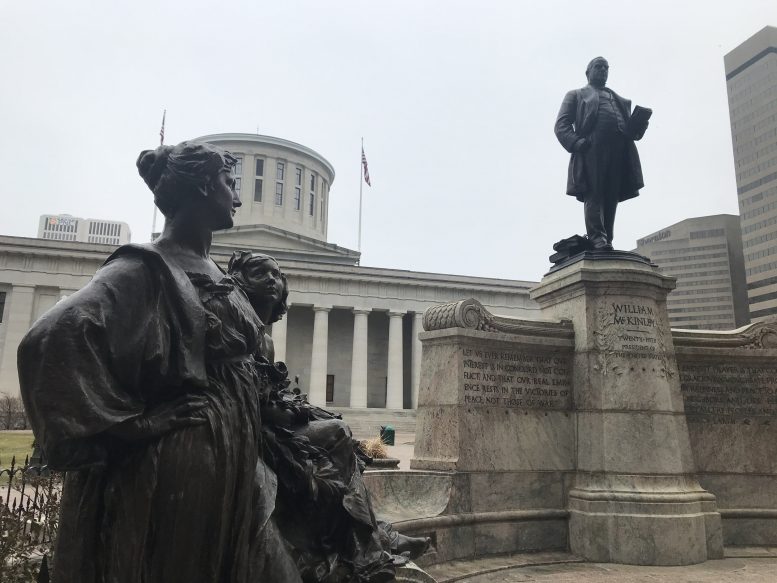Sixteen Ohio House Republicans, six of whom have publicly announced their declination to take a COVID-19 vaccine, proposed legislation Tuesday to build legal protections for people who decline vaccinations.
Under the bill, governments, schools and private businesses could still impose a vaccine requirement. However, the bill would force them to exempt anyone who submits in writing a claim of medical contraindication, “natural immunity,” or “reasons of conscience, including religious conviction.”
After submitting their refusal in writing, people “shall not be required to do anything” more, under the bill.
People, businesses, and governments would not be able to “discriminate against, deny service or access to, segregate, require a facial covering or other vaccination status label for, or otherwise penalize an individual financially or socially” for declining a vaccine.
The legislation would apply for all vaccines, not just COVID-19.
Lead sponsor Rep. Jennifer Gross, R-West Chester, named the bill the “Enact Vaccine Choice and Anti-Discrimination Act.” She said in a news release that while she is “pro-vaccine,” it’s a matter of freedom.
“Without the exemption provisions this bill provides, the notion of a vaccine passport could easily lead to a class system in Ohio where segregation and discrimination will proliferate,” she said.
Ohio Advocates for Medical Freedom, an anti-vaccine advocacy group, said in a message on its Telegram that Gross has been “amazing to work with on bringing forward this bill.” OAMF, which advocates for broader immunization exemptions, regularly posts on its social media accounts misleading or inaccurate information about the COVID-19 vaccine.
Several news outlets, including the Dayton Daily News and the Cincinnati Enquirer, recently canvassed lawmakers on whether they’d take the COVID-19 vaccine.
Of the bill’s sponsors who answered when asked:
- Seven said no: Reps. Scott Wiggam, Rodney Creech, Reggie Stoltzfus, Thomas Brinkman, Bill Dean, Ron Ferguson, and Gross, who said she wants to wait a few years
- Rep. Jay Edwards, R-Nelsonville, said maybe
- Rep. Nino Vitale, R-Urbana, wouldn’t say but notedhe “never vaccinated any of [his] kids”
The bill’s introduction comes as more than 108 million Americans have received at least one dose of the COVID-19 vaccine, according to CDC data.
In the last several weeks, real world findings have shown some of the vaccines’ power and safety. For instance, CDC researchers followed nearly 4,000 health care workers who received some of the first COVID-19 vaccines from Pfizer/BioNTech and Moderna, finding they were 90% effective.
By February, Israel vaccinated 84% of its 70-and-up population. Researchers found the age group’s rates of COVID-19 patients requiring a ventilator suddenly plummeted when compared to younger citizens. This suggests the vaccine reduces the risk of severe COVID-19, according to the report.
Additionally, safety analysis of the first 13.8 million COVID-19 vaccines detected rare (4.5 per million) cases of anaphylaxis, within range of the same for several other common vaccines. A CDC report found the vaccines’ safety profile “reassuring.”
Vaccines have a long history of eradicating diseases. There hasn’t been a smallpox outbreak worldwide since 1980. The World Health Organization estimates vaccines prevented as many as 10 million deaths between 2010 and 2015 alone.
While vaccines protect individuals, they can also protect people in communities who cannot take vaccinations by limiting the pool of viable hosts for a virus — a concept known as herd immunity.
Gov. Mike DeWine has said on several occasions he has no plans to impose any mandate to receive the COVID-19 vaccine, nor create any kind of “vaccine passport” system to demonstrate immunization. Last week, he said he believed the facts would win out on their own.
Regardless, conservatives in the General Assembly have been quick to denounce the idea.
Rep. Haraz Ghanbari, R-Perrysburg, issued a statement Tuesday announcing his receipt of a COVID-19 vaccine, while noting he does not support any effort to mandate it.
How businesses plan to navigate a world on the tail end (hopefully) of a pandemic is unclear and seemingly the newest frontier in a culture war.
On the left, New York recently announced a digital “Excelsior Pass” to allow residents to attend concerts, weddings and other events. On the right, Florida Gov. Ron DeSantis issued an executive order banning “vaccine passports.”
Last week, state Rep. Al Cutrona, R-Canfield, announced similar legislation to ban vaccine passports (the bill has not yet been formally introduced).
At the time, Ohio Chamber of Commerce spokeswoman Julie Wagner Feasel said while the Chamber generally supports letting businesses operate free from government interference, “a global pandemic like we’re experiencing here is obviously unprecedented and we’re discussing these types of issues with our members.”
***
Also from Ohio Capital Journal:
After plateau, COVID-19 trickles upward in Ohio
Despite an accelerating vaccination effort, COVID-19 is on an upswing in Ohio.
There are currently 1,140 Ohioans in the hospital with COVID-19, compared to 839 on March 21.
Similarly, in mid-March, about 1,400 Ohioans were contracting COVID-19 per day on average. By the end of the month, the figure hit 1,700, according to data from the Ohio Department of Health.
The seven-day average test positivity rate — portion of diagnostic tests on a given day with positive results — reached 4.3% Tuesday compared to 3% in early March.
None of these indicators are anywhere near their winter peaks. However, their ticking upward comes despite efforts to slow the coronavirus’ spread through three COVID-19 vaccines authorized for use. READ MORE
Three Ohio energy giants haven’t paid federal income taxes in three years
They’re making billions and they’ve gotten hefty subsidies from ratepayers. Yet three big energy companies doing business in Ohio haven’t paid federal income tax since the 2017 Trump tax cuts, according to a new report.
In fact, Akron-based FirstEnergy, Columbus-based AEP and Charlotte, N.C.-based Duke Energy had negative effective tax rates, according to the report by the Institute on Taxation and Economic Policy, a nonprofit, non-partisan think tank.
The paper, which analyzed tax disclosures in the corporations’ annual reports, found that 55 profitable companies didn’t pay any federal income tax in 2020, and 26 hadn’t paid any in the three years since the Trump tax law, known as the “Tax Cuts and Jobs Act.”
“Now, with most corporations reporting their third year of results under the new corporate tax laws pushed through by President Donald Trump in 2017, it is crystal clear that the TCJA failed to address loopholes that enable tax dodging — and may have made it worse,” the report said.
The 2017 law cost nearly $2 trillion, in part by cutting the corporate income tax rate from 35% to 21%. Research indicates that the great majority of the benefits from the law went to the wealthiest Americans while it didn’t come close to delivering the economic stimulus that Trump promised. READ MORE
‘The People’s Budget’ advocates call for tax code, education changes in new state budget
Elected officials and local advocates are calling for state budget changes that emphasize issues spotlighted during the pandemic, including economic inequality and education system flaws.
Policy recommendations were spelled out by think-tank Policy Matters Ohio and the Ohio Organizing Collaborative to change tax code and fill loopholes they say would not affect ordinary Ohioans, but would force the wealthiest groups to “pay their fair share.”
“The last time that we had a tax system in our state that resembled something like fairness and asking all Ohioans to pay their fair share, I was barely out of diapers,” said Portage County Treasurer Brad Cromes, on a Tuesday press call about the budget recommendations. “And since then, the inequality in our taxing system has only gotten worse.”
Some of the recommendations being pushed by policy groups include restoring a 7.5% income-tax rate for those making more than $218,250, a rate approved under Gov. George Voinovich in the early 1990s. A new 8.5% rate on income over $500,000 was also recommended.
Also as part of tax code changes, the organizations want to see an “LLC loophole,” or small business income deduction, reduced from $250,000 to $100,000, because they say the “loophole mostly helps increase the profits of wealthy business owners, without creating jobs or strengthening communities,” according to the budget breakdown. READ MORE





